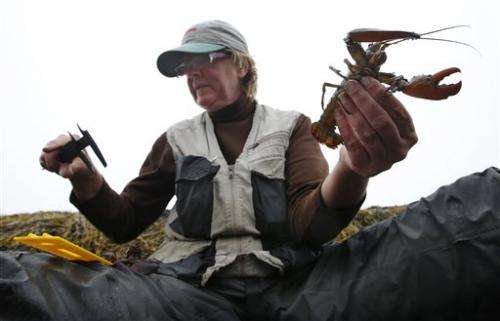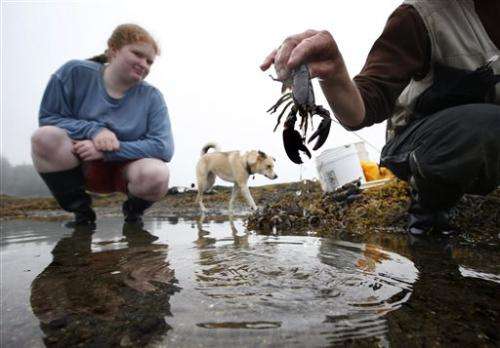Warming Gulf of Maine imperils lobster, fish catch

The New England region's famous fish and lobster could one day disappear, and its rocky beaches could become invisible, obscured by constant high waters.
It's already starting to happen. The culprit is the warming seas along the North Atlantic—and in particular the Gulf of Maine, whose waters are heating up faster than 99 percent of the world's oceans, scientists say.
Long-established species of commercial fish, like cod, herring and northern shrimp, are departing for colder waters. Black sea bass, blue crabs and new species of squid—all highly unusual for the Gulf—are turning up in fishermen's nets.
The Gulf of Maine's warming reflects broader trends around the North Atlantic. But the statistic—accepted by scientists at the National Oceanic and Atmospheric Administration—underscores particular fears about the Gulf's unique ecosystem and the lucrative fishing industries it supports for three U.S. states and two Canadian provinces.
"These changes are very real, and we're seeing them happen quickly," said Malin Pinsky, a biology professor at New Jersey's Rutgers University who studies ocean temperature change and was not involved in the research that resulted in the 99 percent statistic.
It is a rallying point for environmental activists, who see the response to the temperature rise and its impact on fisheries as a touchstone for the global debate about climate change.
"The warming is already here," said Jeff Young, a spokesman for Pew Charitable Trust's oceans project, which has campaigned in favor of restrictions on fishing for herring, another species leaving for colder water. "And we have to deal with it."
The rising waters in the Gulf—a big dent in the East Coast stretching from Massachusetts to Nova Scotia and New Brunswick—have interfered with the work of Diane Cowan, founder of the Lobster Conservancy, who has conducted lobster censuses in the northeastern New England states for 22 years.
The shore of a cove off Maine's Friendship Long Island has long been the best site on the East Coast to find baby lobsters, she said. Around 2007, she couldn't lift a rock without finding one, and usually found several.

But the rising sea has prevented her from getting there much since 2010, she said, because it's almost always underwater.
On a recent August morning, she made it to the site and found 19 young lobsters—far down from the huge colonies she found seven years ago, she said.
"Things have changed dramatically," she said.
The rising sea is connected to the warming waters because higher temperatures make the water less dense, said Bob Steneck, a professor at the University of Maine's School of Marine Sciences.
Until 2004, Gulf temperatures were increasing by about 0.05 degrees Fahrenheit (.3 degrees Celsius) per year since 1982, about in line with worldwide trends, said Andy Pershing, chief scientific officer at the Gulf of Maine Research Institute and the man behind the 99 percent figure. But then the pace accelerated to about a half-degree F per year—nearly 10 times faster.
Scientists are not certain why. The rest of the oceans are also warming, albeit not as fast, as increased carbon dioxide in the air has contributed to rising temperatures, Pershing said.
"Atmospheric events" could be pushing additional heat into the Gulf, causing a "perfect storm" of conditions that combine to dramatically raise temperatures there, said Nick Record, a research scientist at the Bigelow Laboratory for Ocean Sciences, a Maine center for oceanography. Pershing and many peers agree.
Another possible cause, Pershing said, is that shifts in the Gulf stream, the Atlantic current that originates in the Gulf of Mexico and keeps Europe mild, warmed the ocean off the Northeast.
The Gulf of Maine's temperature is expected to rise more than 4 degrees Fahrenheit by the end of the century, Pinsky said.
The 99 percent statistic isn't arbitrary. Pershing and others compared ocean trends and presented the figure to NOAA in April.
Pershing's work illustrates that the Gulf is indeed among the fastest-warming bodies of water, said Roger Griffis, climate change coordinator for NOAA Fisheries Service.
The Gulf of Maine, he said, is "one of the poster children, unfortunately, for major changes."
Its historical chill and strong tidal currents, which mix the waters and increase nutrients, make it one of the most productive marine ecosystems and a key summer territory for rare whales.
But half of 36 fish stocks studied in the Northwest Atlantic Ocean, including many commercial species, have been shifting northward over the past 40 years, a 2009 NOAA report said.
Ironically, the warmer water has created ideal conditions for lobsters and contributed to an overabundance in recent years, causing prices to tumble to their lowest point in nearly two decades in Maine. But continued warming could force to them to move north or die off, Steneck said.
© 2014 The Associated Press. All rights reserved.
















